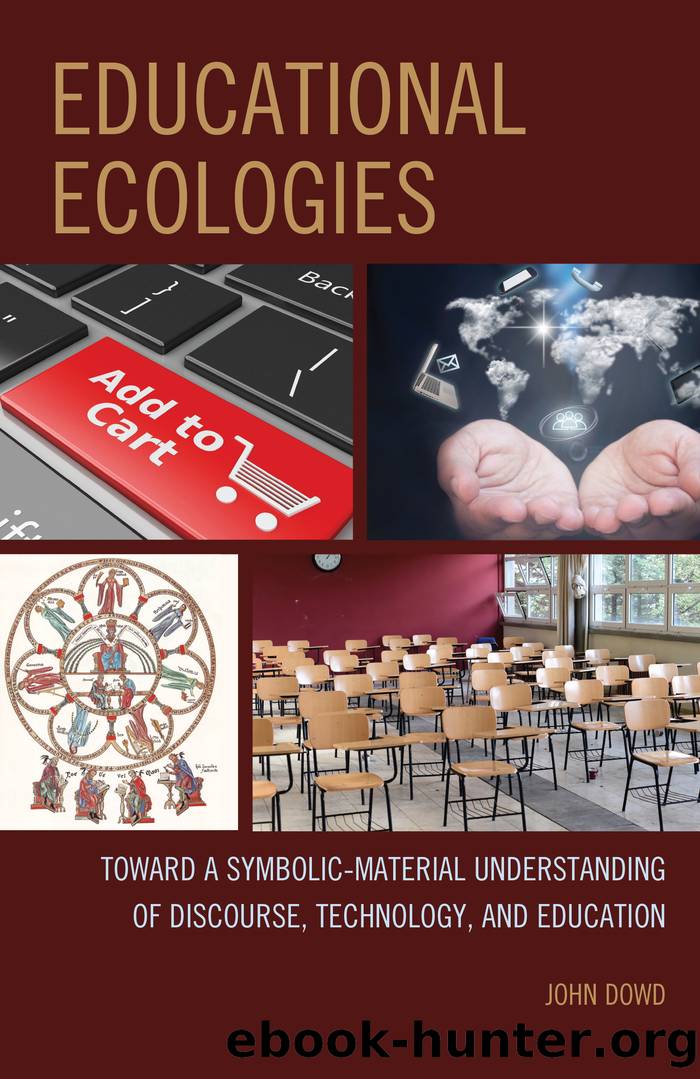Educational Ecologies by Dowd John;

Author:Dowd, John;
Language: eng
Format: epub
Tags: undefined
Publisher: Lexington Books
Published: 2012-08-15T00:00:00+00:00
The serious attention Kurzweilâs work is receiving is difficult to ignore. So too is the underlying discourses of progress, entrepreneurialism, and inevitability, which empower much of Kurzweilâs vision of homo technologicus and makes the critical vantage point required to assess the relationship between education and technology difficult to maintain.
Within higher education, any critique of the above relationship is often met with scrutiny by those charged with more efficiently streamlining teaching and learning (Archibald and Feldman 2010). This discourse becomes problematic precisely due to the general attitudes and actions it influences, which manifest in ways distinct to specific material sites, objects, and practices. With regard to higher education, these discourses bias the ways we think about and organize our educational and technological environments. A point expanded upon later in this chapter.
Among Kurzweilâs cleverer rhetorical denunciations is his coupling of âLudditeâ with another powerfully evocative concept, âfundamentalistâ (2005). A heading in his book entitled âThe Threat from Fundamentalismâ begins with a paragraph on the imminent and especially insidious threat of radical Islamic terrorism (Kurzweil 2005). He argued that although it appears these terrorists are solely after wanton violence, their real agenda is to turn back progress on âsuch modern ideas as democracy, womenâs rights, and educationâ (414). Interestingly enough, he uses this example as segue into his denunciation of Luddites. By leading with his description of fundamentalist Islamic terrorists and drawing attention to the fact that they too are concerned with halting progress, the rhetorical force is carried over to the Luddite who, like the terrorist, desires only to stop progress. Prior to this point, he uses âfundamentalistâ and âLuddites.â However, in the section described above he loses the âandâ to refer to this group solely as âfundamentalist Ludditesâ (Kurzweil 2005, 415).
At first glance this may not appear a serious move, but upon closer inspection extremely powerful images surface as to the dangerousness of anything perceived to be Luddite. By tying the terrorist to the Luddite in regard to the latterâs purported desire to halt progress, Kurzweil further equates the Luddite and the terrorist in regard to the propensity for violence. This rhetorical link is particularly problematic in a post 9/11 world. Through the appropriation of one devil term (Burke 1966, Weaver 1965) âLuddite,â Kurzweil and others brush aside any opposition to unmitigated technological growth, regardless of its consequences. This closes off important dialogue concerning technological development and appropriation, and leaves most citizens out of the decision making process.
In a similar fashion fellow co-founder of Singularity U, Peter Diamandis, aims to leverage technology to address major global problems. His credentials, like Kurzweilâs, are impressive. He received degrees from MIT in molecular genetics and aerospace engineering, and his M.D. from Harvard Medical School. In addition to his formal education Diamandis is a self-described entrepreneur and is best known for being the founder and chairman of the X-Prize Foundation (xprize.org 2015). According to X Prizeâs website, the main goal of this educational non-profit is to provide competitive financial incentive to harness the intellectual and
Download
This site does not store any files on its server. We only index and link to content provided by other sites. Please contact the content providers to delete copyright contents if any and email us, we'll remove relevant links or contents immediately.
The Art of Coaching Workbook by Elena Aguilar(51198)
Trainspotting by Irvine Welsh(21663)
The Secret History by Donna Tartt(19085)
Twilight of the Idols With the Antichrist and Ecce Homo by Friedrich Nietzsche(18632)
All the Missing Girls by Megan Miranda(16023)
Cat's cradle by Kurt Vonnegut(15351)
Ready Player One by Cline Ernest(14675)
Talking to Strangers by Malcolm Gladwell(13370)
Fangirl by Rainbow Rowell(9249)
The remains of the day by Kazuo Ishiguro(8998)
The Compound Effect by Darren Hardy(8965)
Thirteen Reasons Why by Jay Asher(8909)
Tools of Titans by Timothy Ferriss(8393)
Periodization Training for Sports by Tudor Bompa(8271)
Wonder by R. J. Palacio(8109)
The Lover by Duras Marguerite(7901)
A Court of Wings and Ruin by Sarah J. Maas(7844)
Change Your Questions, Change Your Life by Marilee Adams(7780)
The Complete Stick Figure Physics Tutorials by Allen Sarah(7372)
